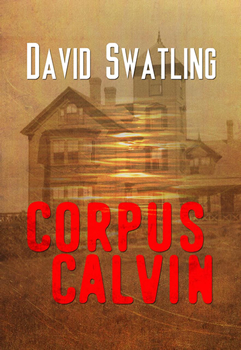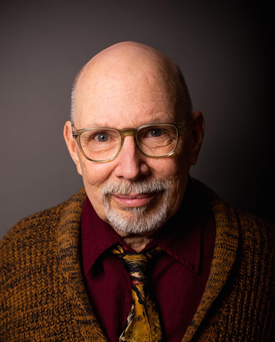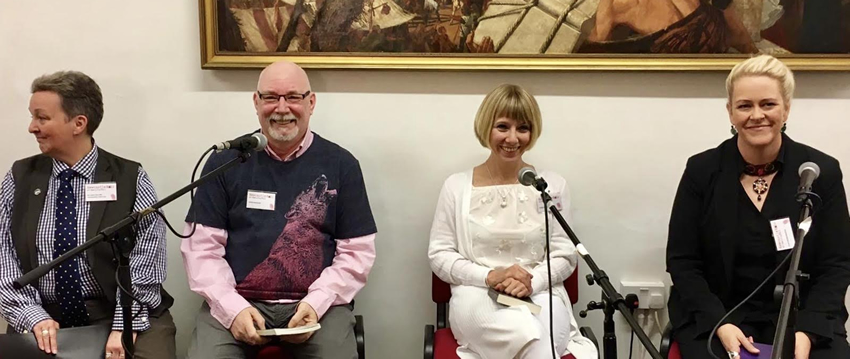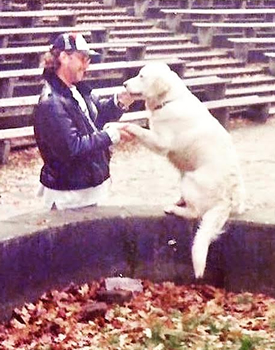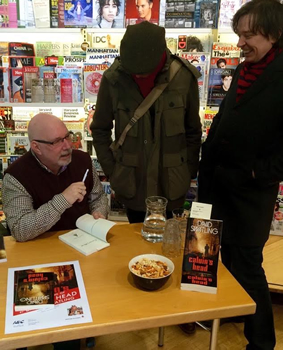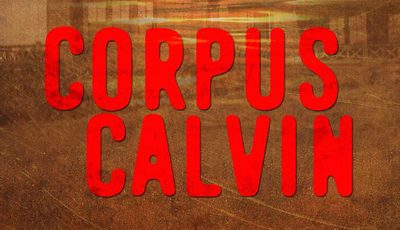

Features Up Close: David Swatling
Dogged Persistence
David Swatling made his debut in 2014 with Calvin’s Head, a psychological thriller about a gay American expat who crosses paths with a diabolical serial killer in Amsterdam. The eponymous Calvin is protagonist Jason Dekker’s immensely charming companion, who happens to be a dog. Told from multiple points of view—including Calvin’s—Swatling’s first novel was shortlisted for 2015’s prestigious Lambda Literary Award, marking its author as a major new talent.
The serial killer has been dealt with, and Dekker is stateside once again, but if he and Calvin are hoping for a stress-free retreat in the mountains of New Hampshire, they’re about to be disappointed. They barely have time to unpack their bags when Dekker learns his old college friend—who now maintains a rustic White Mountains inn with her 10-year-old son, Ethan—is fending off what appears to be a vengeful ghost. Dekker and Calvin are forced into service once again when they realize there are genuinely dangerous forces at work, and that Ethan (and his imaginary friend) might hold the key to a mystery that stretches back to the Civil War.
CORPUS CALVIN, out this month from Bold Strokes Books, is a rare beast in the publishing (or any other) world: a sequel that surpasses the original. With its cozy-adjacent setting, supernatural trappings, and nary a serial killer nor sex dungeon in sight, CORPUS CALVIN is about as different from Calvin’s Head as you can imagine, but the eight years between novels have seen Swatling hone old skills and develop new ones. In Dekker and Calvin’s second outing, he juggles even more diverse POVs and multiple timelines, adds extra layers to Dekker and Calvin, and pulls off at least one stunner of a reveal.
In his latest interview with The Big Thrill, Swatling talks about the inspiration for CORPUS CALVIN, the eight-year gap between novels, and what the future might hold for Dekker and Calvin.
You have a pretty colorful story about the inspiration for Calvin’s Head. Can you trace CORPUS CALVIN to any specific event or spark?
The inspiration for CORPUS CALVIN came more from a confluence of events. During the summer of 2012, I was working on the second draft of Calvin’s Head, which I thought of at the time as a standalone psychological thriller. Most of it was done while visiting a dear college friend who owned a charming inn in northern New Hampshire. Having discovered the joy of a personal writer’s retreat, I returned the following summer, when Bold Strokes Books offered me a contract to publish the book. Early readers had already asked me, “What happens next?” and now so did my editor. I hadn’t yet considered “next,” but I looked around and thought, why not bring Dekker and Calvin here? A major change of scenery might be interesting—from flat urban Amsterdam to the rugged White Mountains.
My first idea was a killer targeting teenage boys, something I quickly rejected. Dekker escapes a serial killer in Amsterdam, crosses the ocean, and immediately is confronted with another one? I know that’s the kind of thing a lot of series do, but it lacked credibility to me–and also, in my previous work in theater and radio, I’d never liked repeating myself. So let’s try another option. Maybe even a different genre? In the mid-’90s when my friend first bought the inn, she thought it was haunted. Aside from the usual mysterious banging, footsteps, or whistling in the kitchen, there was her dog’s absolute refusal to go up the stairs to the Tower. Hmmm. I had a smart dog in my story. What if …? She also told me about the visit by an art curator with an old painting of unknown provenance, which he was convinced had been painted at the inn. Hmmm. Dekker had a background in art history. What if …?
One more thing. The historical society of nearby Littleton sponsored a tour of their biggest cemetery, which I couldn’t resist joining, loving cemeteries as I do. The guide pointed out the grave of the first African American to be buried there. He had been a popular town fire chief in the early 20th century. Nothing was said about what brought him to New Hampshire. However, a quick calculation based on his date of death revealed he would’ve probably been a child during the Civil War. And that was the crucial spark that ignited my imagination.
CORPUS CALVIN is quite different from Calvin’s Head, for reasons I can’t go into without traipsing into spoiler territory. But I can say that you’ve put Dekker and Calvin in two radically different scenarios, and CORPUS CALVIN features a new setting and an all-new slate of supporting characters. From your perspective, what makes a Dekker-and-Calvin book a Dekker-and-Calvin book (besides, you know, Dekker and Calvin)? Are there specific themes or elements that will reliably show up in future installments, should we be lucky enough to get them?
I’m not one of those authors bothered much by spoilers. If you put in enough twists, no one can spoil everything! I think that’s one essential element in my books. I’m a fan of the unexpected. I even manage to surprise myself sometimes. But just as important to me is the use of multiple points of view. Dekker and Calvin may be the protagonists propelling most of the action, but I like giving voice to an antagonist with an equally strong perspective. Probably one or two other characters, as well. I read Faulkner’s The Sound and the Fury in high school and found his use of that storytelling technique utterly compelling. We write the kind of books we want to read.
Tell me about your decision to set the main story in the mid-’90s.
No big mystery here. I was homeless in Amsterdam during the summer of 1995, so that’s when I set Calvin’s Head. CORPUS CALVIN follows fast on its heels—maybe two weeks later tops—even if they are completely different stories.
Second books are famously difficult, and you had a few challenges to deal with on top of a writer’s normal existential horror and crippling neuroses. What helped you get through it?
I remember sitting at the ThrillerFest 2015 Debut Breakfast, listening to Steve Berry wax philosophical about so-called Second Book Syndrome, and thinking, yes, I know all about this difficult transition from writer to author. I never imagined four months later, almost midway through writing CORPUS CALVIN, the diagnosis of a serious medical condition would slam the brakes on writing the novel for three years. While receiving treatment (successfully, I might add), Nancy Bilyeau, then editor of The Big Thrill, asked if I’d interview some authors. Less taxing, but it kept me writing. Then Dawn Ius, current editor, asked if I’d judge Best Hardcover Novel for ITW. Again, reading was not as intensive as writing, but it kept me in touch—and I learned a helluva lot from reading all those thrillers! And my numerous author friends were incredibly encouraging as I doggedly promised, “I’ll get back to it soon”—even if inside I wasn’t sure. But I don’t regret the long break in the process. Facing your own mortality halfway through writing gave a decidedly fresh perspective on where the story was going.
CORPUS CALVIN is full of memorable characters who are so much more than the sum of their quirks. Which POV was the most fun to write?
I love “the sum of their quirks.” I am so stealing that! All my characters were fun to write, each in their own very specific way. If you’re going to twist my arm and say, “Choose one!” I’d have to pick the psychic Valraven, in part because his point of view was so alien to me. And yet, it was imperative that his voice be as authentic as all the others. Fortunately, I had someone to guide me through his paranormal world, someone who shares Valraven’s gift for helping the dead cross over. He is nothing like the mediums seen on television, or the clichéd depictions in films. He’s an everyday working-class guy, with a healthy sense of humor about his “night gig,” which he nevertheless takes very seriously. He generously shared his experiences, offered helpful suggestions, and answered any questions I posed. I hasten to add, the duplicitousness of Valraven’s character was entirely my own invention. That was fun to write, too. Enough said.
What was the biggest challenge of writing a neurodiverse 10-year-old, and how did you overcome it?
Interesting word choice, since the term neurodiversity wasn’t coined until the late ’90s. (I googled it!) I wasn’t aware of it in common usage even when I began thinking about Ethan’s character eight years ago. But I’ve known about autism since taking a psychology course in college called Exceptional Children. Also, my sister works as a one-on-one classroom aide with autistic kids. So I had a lot to draw from. The biggest challenge was to avoid stereotyping because each child on the spectrum is unique. No different from other children, really. Rather than dwell on his peculiarities, I focused on his natural curiosity, his boyish exuberance, and his sense of adventure, not to mention his immediate close bond with Calvin. He’s also very clever, sometimes manipulative, and has secrets he knows how to keep. I suppose I tapped into my own inner child—what some might call my Peter Pan complex. I don’t mind. Whatever works.
In your last interview with The Big Thrill, you talked about your path to publication, which involved rejections from what was then the Big Five. (Or was it still the Big Six?) Do you think the queer elements of your first novel contributed to rejections from major publishers? If so, would things be different now?
When I pitched Calvin’s Head at ThrillerFest 2012, one agent asked point blank, “Are all the characters gay?” I laughed and replied, “Everyone except the dog.” She didn’t crack a smile when she said, “Send it anyway.” I shrugged that off at the time, but in retrospect, I do think the queer elements contributed to the complete slate of rejections. However, the tide seems to be shifting, albeit slowly. A handful of queer writers have found success with books released by major publishers. I think the push for more diversity in general by ITW, MWA, Sisters in Crime, and other organizations has helped get the ball rolling in our direction. And I know my queer crime fiction/mystery writer fiends are cautiously optimistic, but there is still a long way to go.
We’re often told that lawyers make good novelists because they’ve put in years of practice weaving compelling stories. You studied drama at Syracuse University and spent years working as an actor on at least a couple of continents. How does that background affect your writing? (I ask this as I marvel at your ability to adopt radically different voices throughout your books…)
It’s safe to say I consider my theater background invaluable as a writer. As an actor, of course, you learn to build a complex character from lines of dialogue and a few simple stage directions. I was fortunate to be cast in a wide range of roles, from an early 20th century Dutch boy to a fire-and-brimstone preacher, a relentless police detective, and an unhinged domestic terrorist. Whether playing a clownish Shakespearean courtier or a schoolteacher dying of AIDS, you bring truth and honesty to characters, ensuring an audience will believe what they know to be an illusion. I try to do the same thing in my novels. It comes back to what I said about the importance of authenticity. Make the characters believable enough to transport the reader into the story.
On that note, can you think of an actorly trick or technique that translates well to writing fiction—something other writers can put in their toolkits?
I needed to know what shoes my character wore before I could fully inhabit him. That may not sound helpful to a writer. But I suggest getting up from the chair once in a while and walk around as your characters, feel how they move, how they interact with each other. Speak their dialogue out loud. Actually, reading the whole book aloud is an excellent tool. Sentences that are awkward to speak are probably clumsy to read.
The world was a very different place in 2014, when Calvin’s Head was published. Tell me about the experience of writing about queer people and the Civil War in today’s political and social climate. I can’t imagine it was easy.
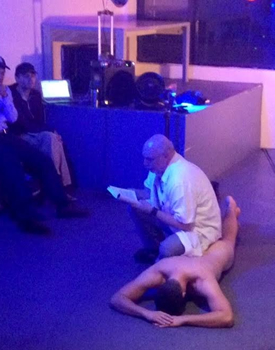
Swatling reads the prologue to Calvin’s Head atop a performance artist at the Bureau of General Services-Queer Division in NYC in 2014.
Not as difficult as you might imagine. Living in Europe, I’m not bombarded with the daily Sturm und Drang of the American political and social climate. And the book was written in two halves, before and after the turning-point elections of 2016. But I do have thoughts—about both parts of your question. Regarding the Civil War, I took my cue from something Walt Whitman wrote. “This War is not one to be catalogued by the General’s reports or the Historian’s ink, but by the blood and breath of the common soldier.” In the diary excerpts of Corporal Quimby, I kept his observations simple. When he notes a horrific, racially motivated incident witnessed by his friend, he makes no commentary or attempt to explain the atrocity. His only concern is the trauma suffered by his friend. No political or social history necessary, at least not from me.
As for writing about queer people today, we all tell our own kind of stories. Sure, in 1995 Dekker became homeless due to the family of his lover who died of AIDS. In CORPUS CALVIN, I could have flown him to New York City and had him join [AIDS activist group] ActUp, but that wasn’t Dekker’s story—at least not the one I wanted to tell. I’ll let other queer writers weave the threads of political and social history into their books—and I’ll admire them for it because we need those stories.
At this point, is it safe to call this a series?
Funny you should ask. If two books are enough for a series … otherwise, the jury is still out.
Can you share any details about what might be next for you?
Ah, I see what you did there—rephrase the question to get a better answer. Honestly, I’m not certain. Part of me wants to do something completely different. Quelle surprise. Maybe a madcap historical romp set in the Roaring Twenties with actors and gangsters, brothel keepers and bootleggers—and perhaps a dead body or two. But I recently had a new idea that bears consideration. A coming-of-age story about a teenager discovering he has a psychic gift, a boy named Ethan and his best friend, Calvin. Hmmm …
- Between the Lines: Rita Mae Brown - March 31, 2023
- Between the Lines: Stephen Graham Jones - January 31, 2023
- Between the Lines: Grady Hendrix - December 30, 2022

